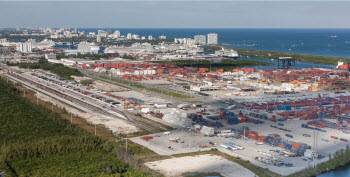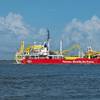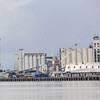Broward County's Port Everglades has partnered with public and private entities on several multimillion-dollar landside infrastructure improvements designed to improve connections with South Florida's major highway and railroad systems.
"Landside congestion plagues many seaports, but Port Everglades is fortunate to have direct interstate highway access and a strong partnership with the Florida East Coast Railway and the State of Florida that keeps commerce on the move," said Port Everglades Chief Executive and Port Director Steven M. Cernak in an address today at the American Association of Port Authorities seminar on international trade lanes. "Our last mile projects are nearing completion and we like to boast that there is only one stop light from Port Everglades to Los Angeles."
Most recently, the Eller Drive Overpass opened to connect the east end of I-595 directly to the port's main entrance. The Florida Department of Transportation (FDOT) invested $42.5 million to build the Overpass, which allows vehicles entering Port Everglades to travel unimpeded over two new at-grade rail tracks that lead into the Florida East Coast Railway's (FECR) new intermodal container transfer facility (ICTF). Interstate-595 connects directly to I-95, I-75 and Florida's Turnpike. Construction is substantially complete and is expected to be finished this spring with dedicated right-turn lanes into the port's main cargo terminal area.
In July 2014, the FECR opened its new $72 million, 43-acre ICTF that is used to transfer both domestic containers to/from South Florida and international shipping containers between ship and rail. This near-dock facility, located on port property, replaced FECR's previous 12-acre intermodal yard located 2 miles away. International cargo goes into the FECR rail yard directly from inside the port, and domestic trucks have a separate entrance under the Eller Drive Overpass. Port Everglades contributed the land to the public/private partnership, FDOT awarded an $18 million grant and the State of Florida provided a $30 million State Infrastructure Bank Loan to the FECR for the project.
"Highway congestion is a concern in many parts of the United States, including the I-95 corridor in Florida. By collaborating with railroads, like FECR, and investing in near-dock rail capabilities, Port Everglades is improving the supply chain to serve the Southeastern U.S. markets in two days," said James R. Hertwig, President and CEO, FECR.
To enhance productivity for over-the-road container movement, Port Everglades also partnered with FDOT to realign McIntosh Road, the main roadway in the port's Southport containerized cargo area. Construction included additional lanes so that it is now an efficient multi-lane loop road with ample room for truck staging. FDOT partially funded the $7 million McIntosh Loop Road project through a grant.
On the port's north side, the security checkpoint at the Eisenhower Boulevard entrance is being moved further south to remove the Broward County/Greater Fort Lauderdale Convention Center from the controlled access area of the port and improve traffic flow for cruise passengers.
In addition to these landside improvements, longer-term capital improvements at Port Everglades include adding cargo berths, deepening and widening the navigation channels, purchasing new Super Post-Panamax gantry cranes and completing capacity upgrades to the existing gantry cranes.
Already underway and slated for completion in 2019, Port Everglades will be adding new cargo berths in its Southport Turning Notch Extension project, which will lengthen the existing deep-water turn-around area for cargo ships from 900 feet to 2,400 feet. Super Post-Panamax gantry cranes will also be added to serve the existing Southport container berths, and the crane rails will be extended to the full length of the extended Turning Notch to better utilize existing cranes.
The port is also advancing an 18-year effort to deepen and widen its navigational channels and turning basin to handle larger cargo ships. Main features of the project are to deepen the main navigational channels from 42 feet to 48 feet (plus 1-foot required and another 1-foot allowable overdepth for a total of 50 feet) and widen the Entrance Channel and the maneuverability constrained Southport Access Channel, including a constricting "knuckle" area between berths 23-26.
porteverglades.net













